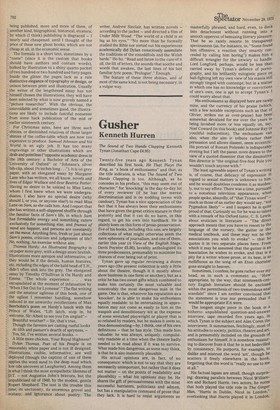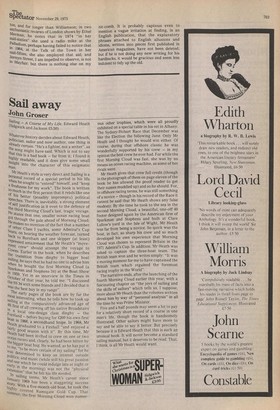Gusher
Kenneth Hurren
The Sound of Two Hands Clapping Kenneth Tynan (Jonathan Cape £4.95)
Twenty-five years ago Kenneth Tynan described his first book, He That Plays the King, as "a book of enthusiasms" and that, as the title indicates, is what The Sound of Two Hands Clapping is too. Although, as he concedes in his preface, "this may seem out of character," for 'knocking' is the day-to-day lot of every reviewer (if he has the merest discrimination and is on nodding terms with candour), Tynan has a nice appreciation of the fact that it has always been their enthusiasms that have given the great critics stature in their posterity and that it can do no harm, in this regard, to get his own into hardback. He is plainly keen on this form of prose-preservation: five of his books, including this one, are largely collections of what might otherwise seem the mere ephemera of journalism, and one of them, earlier this year (A View of the English Stage, Davis Poynter £5.50), lavishly anthologised its three predecessors, presumably to minimise his chances of ever being out of print.
Tynan gave up regular reviewing a dozen years ago (the present collection is only a little about the theatre, though it it mostly about show business in one form or another), but as a critic he has two sweet gifts which combined to make him certainly the most valuable and conceivably the most dangerous man in the game. One is that, whatever his reputation as a 'knocker', he is able to make his enthusiasm equally readable: to be entertaining in approbation may not come as easily to him as the waspish and demolitionary wit at the expense of some wretched playwright or player that is so relished by readers, but he makes it seem so, thus demonstrating—by, I think, one of his own definitions — that he has style. This made him valuable: he was always, uniquely, compulsively readable at a time when the theatre badly needed to be read about if it was to survive. What made him dangerous, as some may think, is that he is also insistently plausible.
His actual opinions are, in fact, of no consequence: which is not to say that they are necessarily unimportant, but rather that it does not matter — on the points of readability and plausibility — what his opinions may be. He shares the gift of persuasiveness with the most successful barristers, politicians and admen, but has a manipulative command of prose that they lack. It is hard to resist arguments so masterfully phrased; and hard, even, to duck into detachment without running into a smooth uppercut of bemusing literary pleasure. That he so rarely resorts to transparent speciousness (as, for instance, in, "Some found him offensive, a reaction they smartly concealed by calling him boring") makes him a difficult wrangler for the unwary to handle. Lord Longford, perhaps, would be less than carried away by Tynan's defence of pornography, and his brilliantly eulogistic piece on bull-fighting left my own view of his mania still strongly tinged with contempt; but in a matter in which one has no knowledge or convictions of one's own, one is apt to accept Tynan's. I could worry about that. His enthusiasms as displayed here are rarely mine, and the currency of his praise (which, with a few notable exceptions such as that of Olivier, strikes me as over-praise) has been somewhat devalued for me over the years in being lavished more or less equally on, say, Noel Coward (in this book) and Johnnie Ray (a youthful indiscretion). The enthusiasm can also, when the aim is tribute rather than persuasion and allows dissent, seem eccentric. His portrait of Roman Polanski is indisputablY riveting but I left the paean more drawn to the view of a quoted dissenter that the diminutive film director is "the original five-foot Pole you wouldn't touch anyone with."
The least agreeable aspect of Tynan's writing is, of course, that delicacy of expression. 111 regard to sexual matters is unknown to hum and he would doubtless condemn it as maidenly, not to say effete. There was a time, pursuant to a notorious television appearance, when people spoke, absurdly, of "that Tynan word" — much as those of an earlier day would say, "not Pygmalion likely" — and I suspect he is quite proud of that. Curiously so; for he was so taken with a remark of his Oxford tutor, C. S. Lewis, about eroticism in literature — "The direct approach means that you have to resort to the language of the nursery, the gutter or the medical textbook, and these may not be the associations you wish to evoke" — that he quotes it in two separate places here. From which it may be assumed that the gutter is an -association he wishes to evoke, and that is a pity for a writer whose prose, at its best, is as mellifluous as the song of an Eton chorister gone straight to heaven.
Sometimes, I confess, he goes rather over mY head, as in such a comment as, "How appropriate, by the way, that nineteenth-century English literature should be enclosed within the parenthesis of two tremendous anal scandals!" since I am neither convinced that the statement is true nor persuaded that It would be appropriate if it were.
The longest single piece in the book is a hitherto unpublished question-and-answer interview, tape recorded five years ago, in which Tynan is the subject and Alan Coren the interviewer. It summarises, fetchingly, most of his attitudes to society, politics, theatre and art, and is presumably included on the grounds of enthusiasm for himself. It is somehow reassuring to discover from it that he is not bedevilled by consistency. He purports, for example, to dislike and mistrust the word 'art', though he scatters it freely elsewhere in the book, forgetting that the word is "really no use to Me at all."
His factual lapses are small, though surprising: drawing parallels between Nicol Williamson and Richard Harris. two actors, he notes that both played the title role in The Ginger Man, "Harris in Dublin, Nicol in London," overlooking that Harris played it in London, too, and for longer than Williamson; in two enthusiastic reviews of London shows by Ethel Merman, he notes that in 1974 "in her mid-sixties" she used a radio mike at the Palladium, perhaps having failed to notice that in 1964, at the Talk of the Town in her mud-fifties, she also employed that aid; and J. errnyn Street, I am impelled to observe, is not In Mayfair; but there is nothing else on my
nit-comb. It is probably captious even to mention a vague irritation at finding, in an English publication, that the explanatory phrases attached to English allusions and idioms, written into pieces first published in American magazines, have not been deleted; but if he is not doing any new writing for his hardbacks, it would be gracious and seem less indolent to tidy up the old.



































 Previous page
Previous page